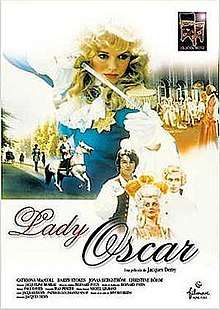Lady Oscar (film)
Lady Oscar (Japanese: ベルサイユのばら Hepburn: Berusaiyu no bara, "The Rose of Versailles") is a 1979 English-language romantic period drama film, based on the manga The Rose of Versailles by Riyoko Ikeda. The film was written and directed by Jacques Demy, with music composed by his regular collaborator Michel Legrand. The French-Japanese co-production was produced by Mataichiro Yamamoto for Kitty Films, Nippon TV, and Toho, and was filmed on location in France.[2]
| Lady Oscar | |
|---|---|
 International release poster | |
| Directed by | Jacques Demy |
| Produced by | Mataichiro Yamamoto |
| Screenplay by | Patricia Louisianna Knop |
| Story by | Jacques Demy Patricia Louisianna Knop |
| Based on | The Rose of Versailles by Riyoko Ikeda |
| Starring | Catriona MacColl Barry Stokes Christine Böhm Jonas Bergström |
| Music by | Michel Legrand |
| Cinematography | Jean Penzer |
| Edited by | Paul Davies |
Production company | |
| Distributed by | Toho |
Release date | March 3, 1979 (Japan) April 26, 1980 (France) |
Running time | 124 minutes |
| Country | Japan France |
| Language | English |
| Box office | $220,000[1] |
Catriona MacColl stars as the eponymous Oscar François de Jarjayes, with Barry Stokes as her lover André Grandier, alongside Jonas Bergström, Christine Böhm, Mark Kingston, Georges Wilson, Sue Lloyd, Martin Potter, and Anouska Hempel. A young Lambert Wilson appears in a minor role.
Plot
Oscar François de Jarjayes is a young woman whose father, a career military man, wanted a boy. After she was born her father took to dressing Oscar in boy's clothes and raising her as a man. Privately Oscar acknowledges her feminine side, she dresses as a man and gains an honored position as a guard of Marie Antoinette. In her youth, Oscar is in love with Andre, the son of the family's housekeeper. Years later, when the French Revolution begins, Oscar and Andre's paths cross for the first time in years. With the assault on the Bastille, Oscar and Andre find themselves fighting on opposite sides of the revolution.
Cast
- Catriona MacColl as Oscar François de Jarjayes
- Patsy Kensit as young Oscar
- Barry Stokes as André Grandier
- Andrew Bagley as young André
- Jonas Bergström as Hans Axel von Fersen
- Christine Böhm as Marie Antoinette
- Mark Kingston as General Jarjayes
- Georges Wilson as General Bouillé
- Martin Potter as Count de Gerodere
- Sue Lloyd as Duchess de Polignac
- Anouska Hempel as Jeanne Valois de la Motte
- Terence Budd as Louis XVI of France
- Mike Marshall as Nicolas de la Motte
- Christopher Ellison as Robespierre
- Constance Chapman as Nanny
- Gregory Floy as Cardinal de Rohan
- Shelagh McLeod as Rosalie Lamorlière
- Michael Osborne as Bernard Chatelet
- Angela Thorne as Mademoiselle Bertin
- Paul Spurrier as Prince Louis Joseph
- Rose Mary Dunham as Marquise de Boulainvilliers
- Michael Petrovitch as Charles Alexandre de Calonne
- Lambert Wilson as Cocky Soldier
- Vincent Grass as Insolent Soldier
- Caroline Loeb as Adele
Production
The major sponsor of the film was Shiseido, a cosmetics company, and Catriona McColl promoted a red lipstick for the spring cosmetic line that year.[3] Frederik L. Schodt and Jared Cook translated the entire manga series into English as a reference for the producers of this film, but gave the only copy of the translation to them and it was lost.[4]
The production was based at Auditel Studios in Paris, with filming locations including Jossigny, Senlis, and the Palace of Versailles.
Reception
The film was not a commercial success,[5] and MacColl's portrayal of Oscar, in particular, was criticized; it was felt by some critics that she was not androgynous enough to play Oscar.[6] On Midnight Eye, Jasper Sharp says the film "is one of those works that is so compellingly awful that entire dissertations could be written about what exactly went wrong."[7]
Anne Duggan chooses to view Lady Oscar within the context of Demy's other films. Duggan describes Ikeda's Oscar as having "much more self-knowledge" than the Oscar of the film, describing Demy's Oscar as being "in denial about sexual and class issues". Duggan feels that if agency is taken away from Oscar, it is given to lower-class characters in the film, in particular Andre.[8]
Variety described the film as recalling early Hollywood epics, and praised Catriona McColl's depiction of Oscar as a "woman waiting to burst out of a man's clothing".[9] Kevin Thomas, writing for the Los Angeles Times, described the film as a typical Jacques Demy film, noting its preoccupation with contrasting the lives of the aristocrats and the lives of the poor.[10]
References
- http://www.jpbox-office.com/fichfilm.php?id=7608
- "Lady Oscar". The New York Times. Retrieved 2012-01-30.
- Graham, Miyako (1997). "Lady Oscar & I". Protoculture Addicts. No. 45. p. 41.
- Thompson, Jason (2010-05-06). "The Rose of Versailles". Animenewsnetwork.com. Retrieved 2012-01-30.
- Buruma, Ian (1985) [1984]. "The Third Sex". A Japanese Mirror: Heroes and Villains of Japanese Culture. Great Britain: Penguin Books. pp. 118–121. ISBN 978-0-14-007498-7.
- Shamoon, Deborah (2007). "Revolutionary Romance: The Rose of Versailles and the Transformation of Shōjo Manga". Mechademia. University of Minnesota Press. 2: 3–17. ISSN 2152-6648.
- Jasper Sharp (October 21, 2007). "Lady Oscar". Midnight Eye. Retrieved June 15, 2015.
- Duggan, Anne E (2013-04-01), "The revolutionary undoing of the maiden warrior in Riyoko Ikeda's Rose of Versailles and Jacques Demy's Lady Oscar.(Critical essay)", Marvels & Tales, Wayne State University Press, 27 (1): 34–51, ISSN 1521-4281
- https://variety.com/1978/film/reviews/lady-oscar-1117792425/
- Thomas, Kevin (1983-05-12), "'LADY OSCAR': SEX SWITCH IN FRANCE", Los Angeles Times, Los Angeles Times, v102, pp. M4, ISSN 0458-3035
Further reading
External links
- Lady Oscar on IMDb